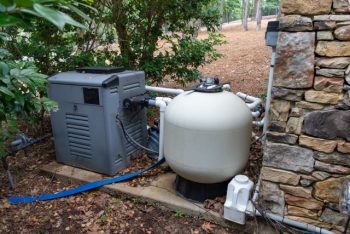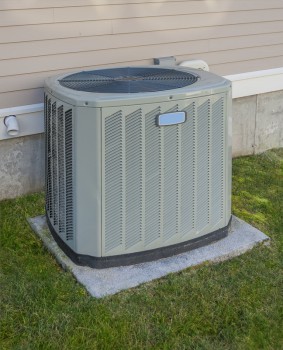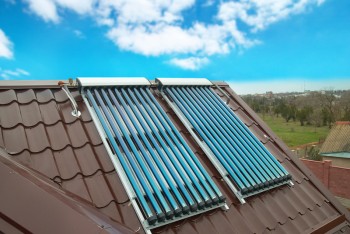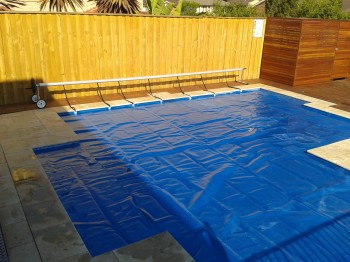Understanding the available pool heating options is essential for the homeowner. Designed to keep your pool’s water at optimum temperatures, these heaters often operate for long periods of time and run up your utility bill. There are four main options to choose from here in Australia.
Article Contents
Gas Pool Heating Options are Perfect for Smaller Pools and Spas

For a larger pool, the cost associated with a gas pool heater is extreme. These heaters will require gas each time they heat up the water and in cases where the pool itself isn’t used routinely enough, leaving the system running will prove to be costly. As a solution that isn’t energy-efficient, it comes as no surprise these units are not environmentally friendly and with an overall life span of just five years, they need to be routinely replaced.
On the flip side, these units do have a few benefits associated with them including:
- Heating is based on water temperature, not air temperature
- Low investment for those on a tight budget
- Will heat up the water extremely fast
Gas heaters can be combined with another form of heating such as solar heating and can work well as a “booster”.
Gas heaters require access to a gas source. This means there needs to be pipes run to the heater and a source for them to connect to. It is important to anticipate installation costs into the mix if you are considering this method.
Heat Pumps are an Exceptional Pool Heating Choice

There are some pros and cons to these heating options for pools. The benefits include:
- Lower operating costs
- Energy-efficient option that is environmentally friendly
- Units last about 10 years
- Don’t need the sun to warm the water
This doesn’t mean there are no disadvantages. The informed homeowner needs to understand these pumps also have:
- Slow heating times (than gas), so you need to plan in advance
- Higher unit purchase costs
- A need for temperatures to be above 10°C to operate properly
- Can be expensive to operate
Roof Based Solar Heating Panels Cut Costs

If you live in Brisbane, Melbourne or Sydney then this is one of the best options since there is a reasonable amount of sun and heat. This is further discussed in our article Solar Pool Heating Sydney.
Fortunately, there are some great benefits including:
- Low annual operating costs
- Little to no maintenance required
- Most environmentally friendly option
- Longer lifespan than other heaters.
For the environmentally savvy individual, these pool heaters are the ideal choice for the home.
You may also check our article Solar Pool Heating – The Complete Buyers Guide for an in-depth review on this pool heating option.
Solar Pool Covers are The Most Effective Solutions Available

When properly installed, you can count on a few benefits with this heating option:
- Water is kept warmer, increasing as much as 46°F (8°C)
- Evaporation will be minimal reducing water waste
- Chemicals won’t be as quickly depleted maximizing their effectiveness, while minimizing the cost
- Work even better when combined with other heating systems
Just keep in mind that installing a solar pool blanket can be tricky. While manual options do roll up, you have to take the time to remove them and place them back on the pool for use. Automatic solutions can make this easier, but their installation can be costly and for many this cost is prohibitive.
Each of the four options has its own unique sets of pros and cons. It is important to weigh your options and determine which of these heater types will meet your needs, within the budget you have available.
Photo Credits: Teaser Photo Attribution: By Jonathan ; Blog Photo Attribution: By Bill Jacobus ; Blog Photo Attribution: By Bill Jacobus
Related Reading:
Cost of Solar Pool Heating
Solar Pool Heating Vs Heat Pump: Which is Better?
Pool Heating Cost
DIY Solar Pool Heating


Hello, I appreciate your advise on selecting the best solution for solar pool heating: Heat Pipe solution ( collectors can also be used to heat the home and for DHW) of the “plastic” and cheap solution, but limited to just pool heating.
Which are the critical factors to consider to designe a pool heating solution ? Do you have any tool or easy calculations to determine number of collectors/heat exchangers/pumps needed ?
I am reaching you from Argentina (Buenos Aires).
Appreciate your help and support !
Thanks for your comment. There are many factors that will affect the design requirements of your ideal pool heating system. To name just a few; your climate; pool size; pool construction materials and your geographic location. You’ll get the most accurate results if you look for a calculator designed for your local conditions.